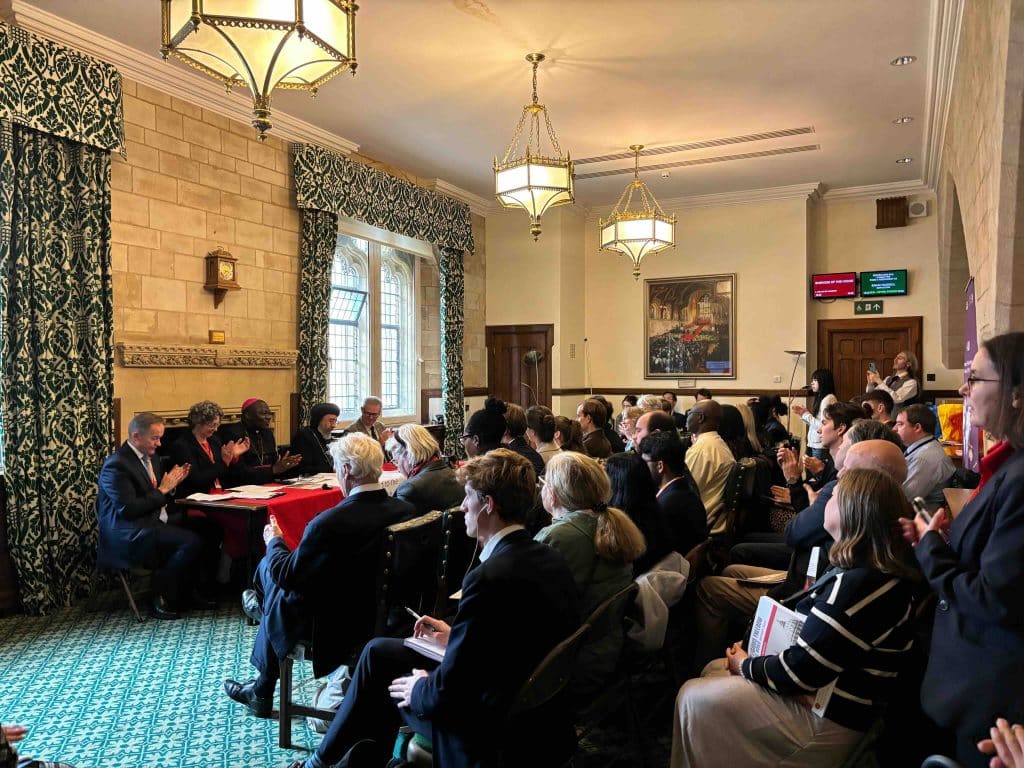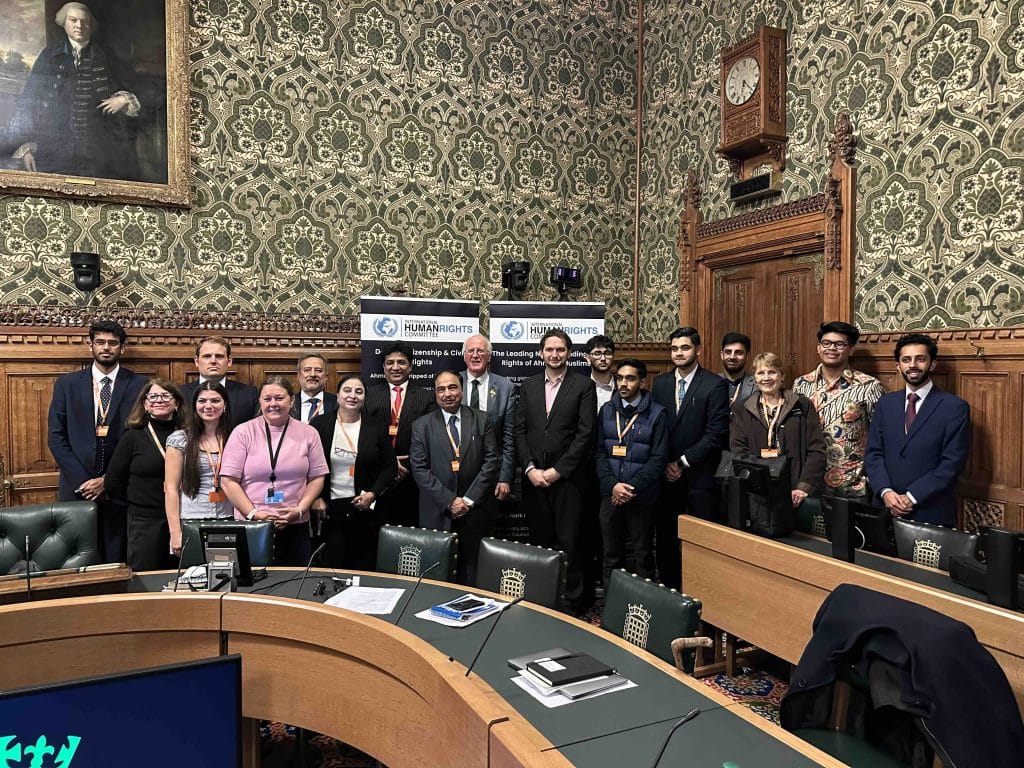Debate on the Queen’s Speech
House of Commons 14 October 2019
Rehman Chishti (Gillingham and Rainham) (Con)
Defence is linked to foreign policy. Britain is respected around the world for the values it stands up for. One of them is freedom of religion or belief. It is not mentioned in the Queen’s Speech, but yesterday parliamentarians from across the House, led by His Royal Highness the Prince of Wales, were at the Holy See for the canonisation of Cardinal Newman. Can the Prime Minister confirm that religious freedom will always be a key priority for our Government?
The Prime Minister
I thank my hon. Friend for everything he does to promote religious freedom around the world, and I can certainly give him that assurance. We will stand up for religious freedom in all our doings, and in all our foreign policy.
House of Lords 15 October 2019
Lord Ahmad of Wimbledon
The challenges the world faces today may be unprecedented, but the opportunities are plentiful. As the United Kingdom prepares to leave the European Union, we are prepared to address with determination, vigour and confidence our future aspirations and goals with hope and optimism. We are raising ambition around the globe to confront myriad challenges, from intolerance and inequality to climate change. This means that we are bolstering our support for persecuted Christians and broader religious freedoms around the world, by implementing the recommendations of the Bishop of Truro’s review of our work at the Foreign Office…
Britain’s Place in the World
House of Commons 15 October 2019
Rehman Chishti (Gillingham and Rainham) (Con)
It is a real pleasure to follow the hon. Member for Liverpool, West Derby (Stephen Twigg). He focused his speech on values. By and large, foreign policy around the world is viewed through three prisms: prosperity, security and values. I, Madam Deputy Speaker, want to touch on the issue of values.
Our Queen’s Speech made it very clear that the United Kingdom will stand up for its values. Those values could be the rule of law, justice, liberty or freedom. I was surprised to see that the freedom of religion or belief was not in the Queen’s Speech. This Government—our Government—asked the Bishop of Truro to commission a report into the persecution of Christians around the world to see, first, whether the Foreign Office understood the scale of the issue at hand and then how we can address it. That was our report. The Government accepted the 22 different recommendations that were in that review.
There can be no compromise on article 18 of the Universal Declaration of Human Rights:
“Everyone has the right to freedom of thought, conscience and religion; this right includes freedom to change his religion or belief, and freedom, either alone or in community with others and in public or private, to manifest his religion or belief in teaching, practice, worship and observance.”
It says “his”. It should also say “hers”, but we should remember that this was in 1948. Why is this important to me? I came to this country from Pakistan in 1984. My father was an imam, my grandfather was an imam, and my uncles were imams. When I arrived, I could not speak a word of English. I moved to my constituency of Gillingham and Rainham. My father, my sisters and I were able freely and openly to practise our faith in our great country. There is now a moral obligation on me and others who are part of minority religious faiths in this great country to stand up for individuals who are being persecuted for their faith in their countries of origin or elsewhere where they are a part of minority religious communities. That is why, for me, there can be no compromise on freedom of religion or belief. I am grateful to the Prime Minister for appointing me, on 12 September, his special envoy for freedom of religion or belief. This is what the Prime Minister said:
“People across the world deserve the chance to practise their beliefs freely. I’m delighted to appoint Rehman as my new Special Envoy and look forward to him building on the important work we have already done on this issue. The UK will always be a passionate advocate for greater tolerance, respect and understanding internationally.”
I am grateful to him for that appointment. Let me make it clear that I will carry out my duties without fear or favour. Yes, I am the Prime Minister’s special envoy and I also report to the Foreign Secretary at the Foreign Office, where I am based, but as somebody who is committed to freedom of religion or belief I look to colleagues across the House.
There were parliamentarians from across this House, led by His Royal Highness the Prince of Wales, at the canonisation of Cardinal John Henry Newman at the Holy See. I am a Muslim, but I stood there and listened to what that great man stood for; and I consider him to be my saint too, because of those values. There can be no compromise on freedom of religion or belief.
Tom Tugendhat (Tonbridge and Malling) (Con)
My hon. Friend is speaking powerfully about freedom of religion or belief. As he knows, my Committee is looking to take evidence in an inquiry on this subject in the coming weeks. Will he speak for a moment about the importance of the Foreign Office in supporting freedom of religion or belief? For example, his own work defending Asia Bibi in Pakistan and speaking up for Coptic Christians in Egypt has been extremely important to many of us.
Rehman Chishti
I am grateful to my hon. Friend, who chairs the Foreign Affairs Committee. I look to his work for guidance because across the House Members of Parliament are respected for their expertise, understanding and credibility, and he demonstrated that on the Asia Bibi case, when he held the Government to account for not doing the right thing. I thank him for standing up for our British values. I resigned from the Government over that case because I did not agree with the way in which it was handled, and the current Prime Minister supported me. If the Chair of the Foreign Affairs Committee wants me to give evidence as the Prime Minister’s special envoy for freedom of religion or belief, I would be more than happy to do so—subject to the rules and criteria of the Foreign Office and the Prime Minister’s office.
I have tendered my terms of reference—eight objectives and 27 terms—to the Prime Minister in order to carry out my work. I have met and listened to brilliant British and international non-governmental organisations such as Christian Solidarity Worldwide, Aid to the Church in Need and Open Doors. I have also met diplomats from across a number of different countries and parliamentarians from Nigeria, and I now look forward to meeting the Prime Minister and the Foreign Secretary to take this work forward.
CSW’s website states that 83% of the world’s population live in nations where religious freedom is threatened or banned. How can that possibly be right? We are talking about countries in east Asia, Latin America, the middle east, north Africa, south Asia and sub-Saharan Africa; there is persecution across the world. The Bishop of Truro’s report makes it very clear that Christians are the most persecuted faith in the world, and that freedom of religion for everyone should be a priority for countries around the world.
I should make a declaration of interest. Before going to the Vatican for three days, I was in Bahrain for over 36 hours, where I met His Majesty King Hamad and looked at the Bahrain declaration. For the two days that I stayed there, the Government of Bahrain provided my accommodation before I went on transit to the Vatican. That happened last week and will be on the Register of Members’ Financial Interests within the timescale. On my visit, I made it clear that we need to work with countries such as Bahrain—which has had churches since 1823 and a Hindu temple for 200 years—along with other international partners.
Before I delivered my terms, I met communities that are persecuted around the world. Here in the UK, I met the British Ahmadiyya Muslim community and the Baha’i community, and listened to them talk about the persecution they face. Working with individuals across the board, I will ensure that freedom of religion is pushed at every possible level.
Let me finally pay tribute to His Royal Highness the Prince of Wales, who has done immense work over the past 40 years on inter-faith dialogue—theological debate and discussion is how we are going to deal with intolerance. I say to colleagues from across the House that I look towards them so that we can have these frank discussions and take this vital work forward, because every citizen has a right to practise their faith openly and freely.
[Earlier]
Rehman Chishti
Colleagues of the hon. Gentleman in the SNP were at the Holy See with parliamentarians from across the House at the canonisation of Cardinal Newman, one of our great British saints. Will he assure me of his support as we take forward the work on freedom of religion and belief so that we can work together around the world in promoting that basic fundamental value?
Stephen Gethins
Yes, I absolutely do. I pay tribute the work that the hon. Gentleman has done on that. We see the devastating consequences when we do not respect one another’s freedom of religion or belief, not least in Syria at the moment. I was fortunate enough to go with Aid to the Church in Need to the Syrian border to see the good work that is being done there and the work done by my own constituents with Sam’s House on the humanitarian crisis.


